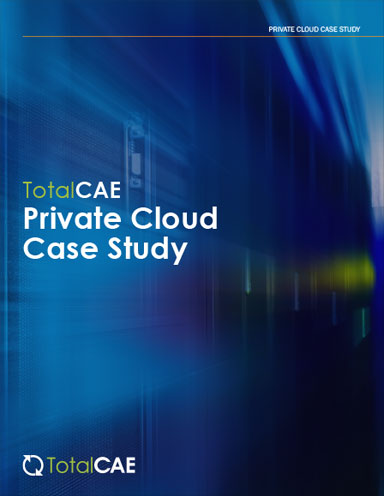HPC for Simulation in the Cloud
New ebook outlines how TotalCAE Infinite on AWS can improve simulation performance.

Latest News
November 29, 2023
As designs become more complex and models grow in size, running engineering simulations requires an ever-increasing amount of compute power and time. For compute-constrained organizations, this can present several challenges.
Many engineers that solve their CAE simulation problems on their laptop or workstation are required to reduce the fidelity of their models or create workarounds to accommodate the limited computational power they have access to in order to obtain simulation results in a reasonable time frame.
High Performance Computing (HPC) on AWS is designed to solve computer-aided engineering (CAE) hardware limitations and leverage specialized hardware and software interfaces to accelerate and improve simulation performance.
Engineers know they need more than just a powerful workstation and want to receive the benefits of HPC and cloud, but making the leap from a workstation to an HPC environment can be challenging, complicated, and potentially costly – and these factors are often a barrier to entry.
Turnkey HPC cluster specialist TotalCAE has published a new ebook titled “TotalCAE Infinite on AWS: A Guide to Digitally Transform Product Innovation with TotalCAE” to help engineers understand how HPC in the cloud can help them accelerate simulation while reducing the cost and complexity of that transition. It provides an introduction into the components and technologies that make up a TotalCAE HPC cluster on AWS.
HPC Options for Engineering
HPC clusters enable CAE engineers to overcome the limitations of a single workstation. The CAE application solver offloads tasks to multiple nodes (server class hardware) that are connected together with a high speed and low latency network into a cluster. A cluster has a head node that takes care of the management tasks of the cluster, several compute nodes, and optionally specialized viz nodes for doing visualization and graphical post-processing of CAE results.
Most CAE software is written using a library called Message Passing Interface (MPI) which breaks the problem down into smaller parts that are distributed across the compute nodes with a HPC scheduler, and calculated in parallel to speed up the model.
HPC clusters can reside both on-premises in your own data center as physical computer hardware that you buy or lease, or they can be programmatically created and operated completely in the cloud. The focus of the new ebook is where the HPC cluster resides in AWS, but note that TotalCAE supports on-prem HPC clusters as well as cloud.
In one example cited in the ebook, a TotalCAE client was able to reduce Computational Fluid Dynamics (CFD) simulation runtimes by 15X by shifting from a 32-core workstation to an AWS-hosted HPC cluster with 384 cores. Before, workstation limitations caused this process to take hours, which limited the number of designs that could be evaluated. With the HPC cluster, the process can be reduced to just minutes.
The ebook also contains specific information that will help customers select the right flavor of cloud-based HPC for their applications, as well as information about exactly how simulation workflows can be completed using the TotalCAE solution.
The ebook will help customers choose the right AWS compute node instances, and provides tips for selecting the right operating system, storage, and other elements. It also explains how to submit, monitor and manage simulation jobs using TotalCAE Infinite on AWS.
There is also a chapter on barriers to cloud adoption, including ease of use, workflow issues, data transfer, CAE license access, and cost management obstacles, and how using TotalCAE Infinite on AWS can help overcome these challenges.
There is a valuable section on how to purchase cloud resources, which notes that using cloud as a 100% on-demand solution can be the most expensive option. The section outlines how to calculate break-even points on cloud purchases, the advantages of AWS savings plans for accessing cloud resources, and more.
The ebook also includes case studies that describe how Accelerate Wind and Lucid Motors leveraged TotalCAE on AWS to solve their simulation challenges.
Download the new TotalCAE ebook today to learn how TotalCAE on AWS can accelerate design innovation in your organization.

More TotalCAE Coverage
Subscribe to our FREE magazine, FREE email newsletters or both!
Latest News





